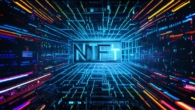
What is the purpose of NFTs
As the world becomes more digitized and cryptocurrencies continue to gain popularity, non-fungible tokens (NFTs) have emerged as a new form of digital ownership. NFTs are unique digital assets that can be bought, sold, and traded on blockchain platforms.
What are NFTs?
NFTs are digital assets that represent ownership of unique items such as art, music, videos, and other forms of content. NFTs are stored on a blockchain, which is a decentralized ledger that records all transactions. Each NFT has a unique identifier, or token, that represents ownership of the item.
The Purpose of NFTs

NFTs serve several purposes in the digital world. Here are a few key benefits:
- Ownership and authenticity: NFTs provide a way to prove ownership of unique digital assets, ensuring that the item is authentic and not a counterfeit. This is particularly important for items such as art, where it can be difficult to verify ownership and authenticity without a physical certificate of origin.
- Monetization: NFTs allow creators and artists to monetize their work by selling digital assets directly to buyers. This can be especially appealing to independent artists who may struggle to find traditional markets for their work.
- Royalties and residual income: NFTs can also provide a way for creators to receive royalties from the sale of their work, even after it has been sold. This can be particularly valuable for artists who create content that is widely popular and continues to generate revenue over time.
- Access control: NFTs can be used to grant access to exclusive content or experiences, such as concert tickets or virtual reality experiences. This can help creators and businesses monetize their content more effectively by limiting access to only those who are willing to pay for it.
- Collectibles and rare items: NFTs can also represent ownership of rare and collectible digital assets, such as in-game items or limited edition digital art pieces. This can create a secondary market for these items, allowing collectors to buy and sell them at a profit.
Real-life Examples of NFTs in Action
There are many examples of NFTs being used in various industries, including:
- Art: The world of art has embraced NFTs with open arms. Many artists have created and sold their work as NFTs on platforms such as OpenSea and Rarible. In 2021, the world’s first-ever auction house to sell exclusively NFTs was launched by Christie’s, further legitimizing the use of NFTs in the art world.
- Music: Several musicians have created and sold their music as NFTs, allowing fans to purchase unique versions of their songs with additional content or features. In 2021, the rapper Snoop Dogg launched an NFT collection called “The Dogg Pound,” which included exclusive merchandise, music videos, and other digital assets.
- Gaming: Many video games have incorporated NFTs into their gameplay, allowing players to buy and sell in-game items on the blockchain. In 2021, the popular game NBA Top Shot released an NFT collection featuring moments from the 2020 NBA Finals, which sold out within minutes.
- Sports: Several sports teams and leagues have created NFT collections featuring unique memorabilia and experiences. For example, the Los Angeles Lakers launched an NFT collection called “The Laker Legacy,” which included rare moments from the team’s history.
FAQs
Here are some common questions about NFTs:
1. What makes NFTs unique?
NFTs are unique because they have a unique identifier, or token, that represents ownership of the item. This ensures that each NFT is one-of-a-kind and cannot be replicated or copied.
2. How do NFTs work on the blockchain?
NFTs are stored on a blockchain, which is a decentralized ledger that records all transactions. When an NFT is bought or sold, the transaction is recorded on the blockchain, creating a permanent record of ownership and transfer.
3. Can NFTs be used for anything other than digital assets?
While NFTs were initially designed for digital assets, they can also be used to represent ownership of physical items such as real estate, cars, and collectibles.
4. Are NFTs subject to taxation?
Yes, NFTs are subject to taxation in many countries, depending on the nature of the asset and the buyer’s jurisdiction. It is important to consult with a tax professional for guidance on taxes related to NFTs.
5. How do I buy or sell an NFT?
There are several platforms where you can buy and sell NFTs, including OpenSea, Rarible, SuperRare, and Christie’s. You will need to create an account and link it to a cryptocurrency wallet in order to purchase NFTs.
Conclusion
NFTs are a new form of digital ownership that have the potential to revolutionize many industries. By providing a way to prove ownership and authenticity, monetize content, and grant access control, NFTs can help creators and businesses more effectively manage their digital assets. As the use of NFTs continues to grow, we can expect to see even more innovative applications in the future.







